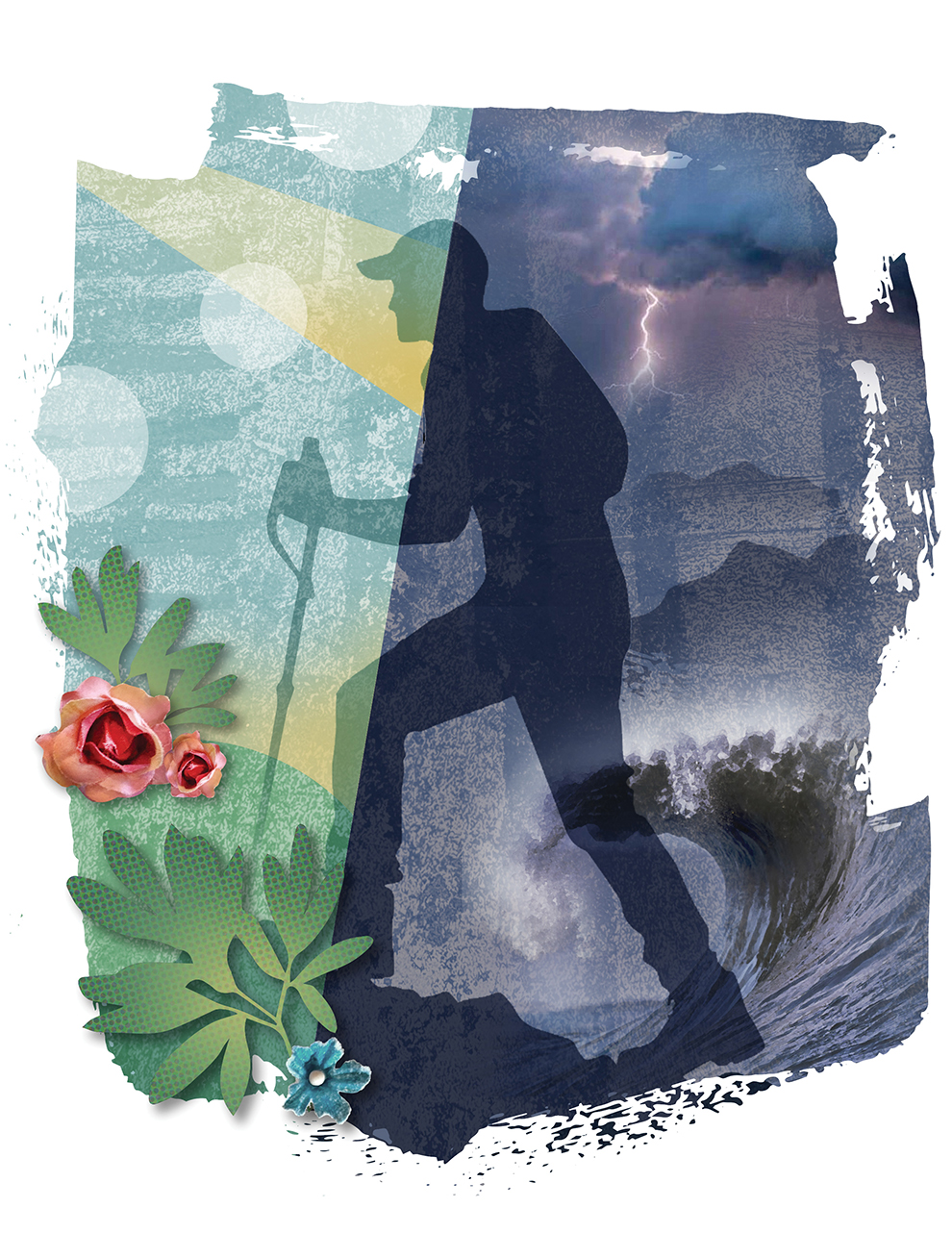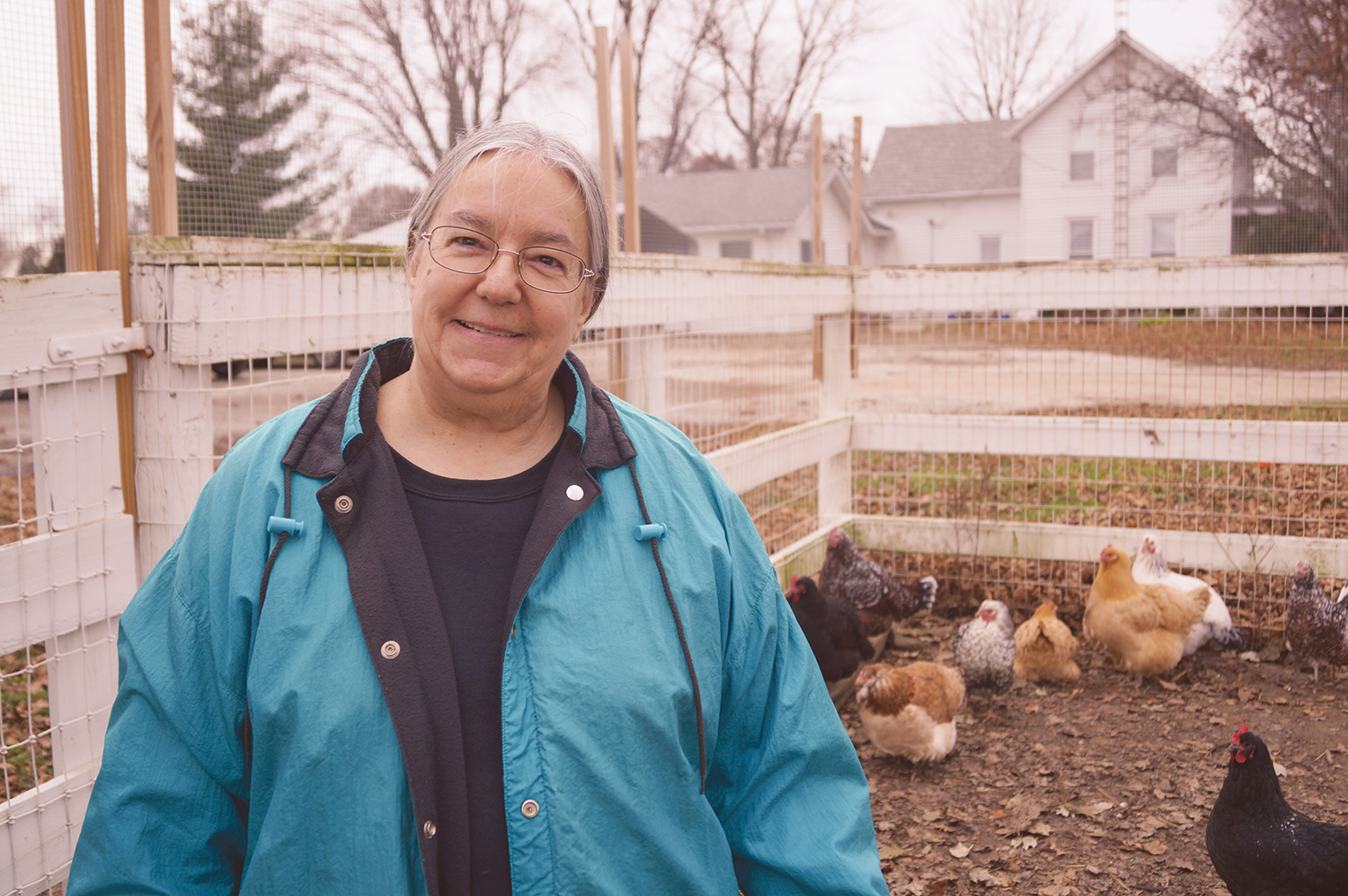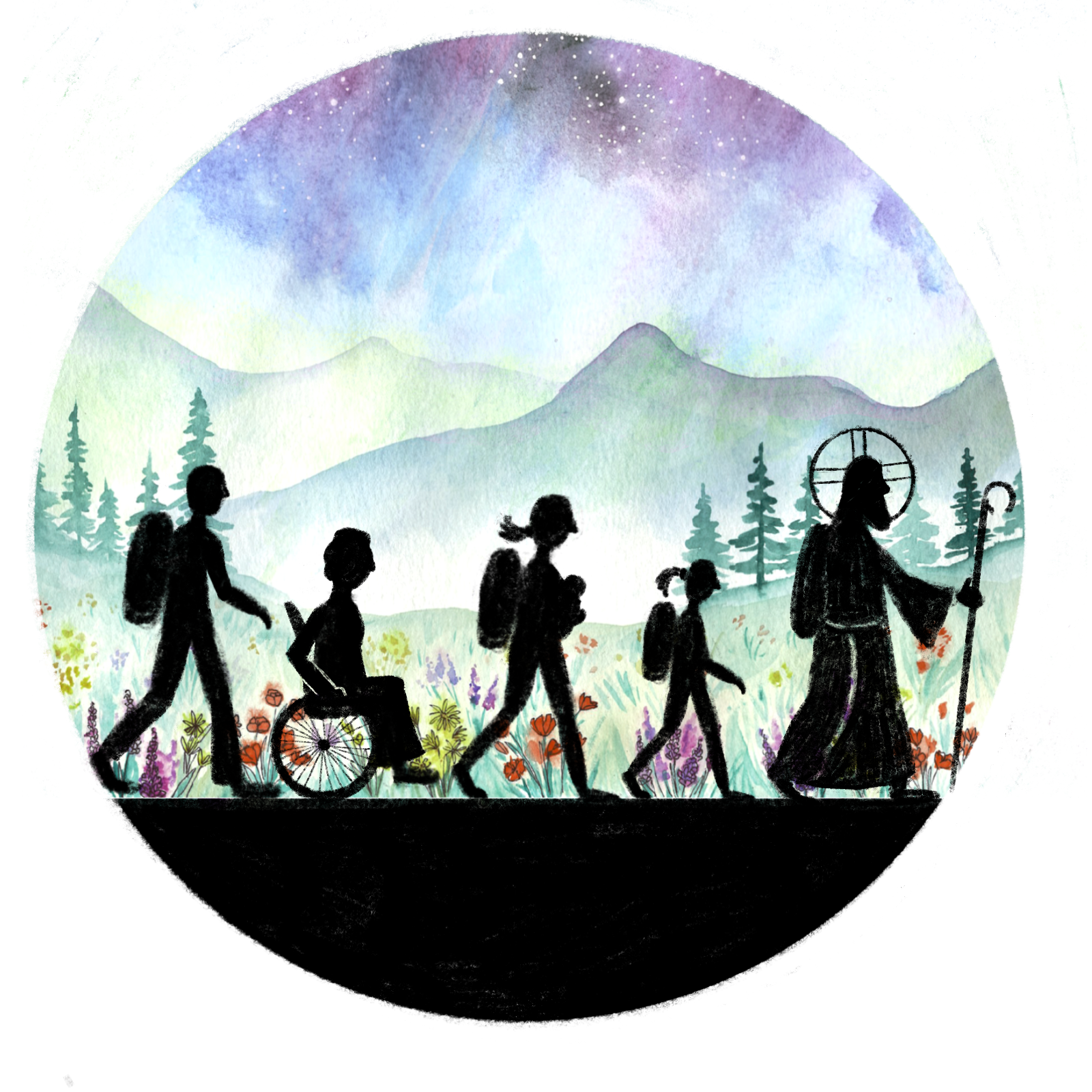
Pilgrims are seekers drawn to make pilgrimages. Pilgrimages are journeys to special and holy places, places that draw forth from within us a deeper sense of connection and belonging to something greater than ourselves. These places can be as far away as we wish, or as close as our backyards, as in my case, the acres of prairie land and woods known as Jubilee Farm. This ecology and spirituality center is sponsored by my congregation and located west of Springfield, Illinois. These spaces and the journeys themselves often inspire personal transformation, leaving us in a different place than we were before.
Hope is a necessary element of these journeys, as it often motivates the journey itself. Hope certainly keeps us on the path and then may itself be transformed into something totally unexpected. Hope is not a given. We cannot sit around waiting for hope to drop in our laps and make us feel better. It is a choice we intentionally make, not once but each and every time we are tempted to choose otherwise.
Hope is not a given. We cannot sit around waiting for hope to drop in our laps and make us feel better. It is a choice we intentionally make, not once but each and every time we are tempted to choose otherwise.
In her opening remarks for the launch of the Catholic Climate Covenant's Pilgrims of Hope for Creation — a nationwide initiative that includes organizing pilgrimages to support living in right relationship with the Earth (see sidebar below) — theologian Sr. Elizabeth Johnson, CSJ, likened hope to a muscle of resilience, a muscle of countercultural resistance. We all know what happens to muscles when they are not regularly used or stretched just a bit beyond their normal routines. So it is with the muscle of hope. Hope itself needs to be used and stretched often. And like all muscles, hope works not just in and of itself but in tandem with others. When we choose hope, we choose it not just for ourselves. Our individual hope must be joined with the collective hope of all those who choose it. Otherwise, it is all too easy to sink into despair, apathy and compliance with injustice.
SEEKING AND BUILDING HOPE
In a March 2025 letter titled The End of the World? Crises, Responsibilities, Hopes, Pope Francis affirmed the need for collective hope. He wrote that hope "does not consist of waiting with resignation, but of striving with zeal towards true life, which leads well beyond the narrow individual perimeter."1 Hope is a choice we make to meet the challenges in our personal lives and, when joined with others, works to build that mutually enhancing world where living in right relationship with the entire Earth community is the norm and not the exception.
There is no doubt that our opportunities for stretching that hope muscle are exponentially multiplying. In that same letter, sent to the participants in the General Assembly of the Pontifical Academy for Life, Pope Francis addressed the current world's "polycrisis." It is not a new word but one that has now come into its own in a frighteningly apparent way. We witness it on the daily news and experience it within our local and global communities. We know that more than 100 wars and armed conflicts are raging around the world,2 and that gun violence, food crises, massive migrations, loss of employment, deepening poverty and epidemics are escalating. And many more of us are accepting the science that shows that all of these calamities are either caused or exacerbated by climate disruption.
The increasing frequency and intensity of storms, floods, drought, heat and rising sea levels are altering the course of life on this planet.3 We see much of the world we have known literally deconstructing around us. We witness or even personally experience the consequences of these crises and the flagrant lack of compassion for our human and other-than-human sisters and brothers.
So how do we choose hope in these escalating crises? Why do we choose it? Where do we find it?
Very simply, we choose it because it is the human thing to do. Our survival as a species has been predicated on exploration, seeking out and moving into sometimes incredibly harsh landscapes that have daunted other species. Our capacity to always search for greater food security and safety and for more opportunity relies on the hope that they are there to be found. We are rational creatures. We are also spiritual creatures. Our innate belief that there is something much greater than ourselves feeds our hope that life can be better than it is and that we have a part in making that happen.
Where do we find hope? We look for it. It is just as evident as the devastation and waste of life we hear of with each news report. We may just need to look harder to see it. There is a growing wave of response, a countercultural resistance of hope to the polycrisis, either meeting it head-on or eroding it from underneath. Many of us are engaging in ways we never anticipated.
We march or speak out when we have never done so before. We form groups to meet with our local legislators about clean energy. We organize training sessions to teach immigrants their rights, and we advocate on behalf of Black and Indigenous farmers. We choose alternative ways to grow our food and to live more sustainably with the rest of the Earth community. We enact and implement our Laudato Si' Action Platform plans, doing what we can with whatever capacity we have.
Our young people rally against book bans, challenge us about the consequences of the Doctrine of Discovery, and become climate activists who have moved judicial courts to act in their favor. These and many thousands of other efforts around the globe are building a community of hope that will not be squelched.
SHIFTING TO AN ECOLOGICAL WORLDVIEW
In concert with these actions is our growing understanding of how intimately we are all connected with one another, with the whole. Our actions, our lifestyle choices, our political and economic decisions are driving the planet's chaos, and we are accountable for them. As humans and as people of faith, it is our role and obligation to live as responsible members of the Earth community. Living in right relationship with our human sisters and brothers, the rest of the Earth community and with God is essential to the entire planet's health and well-being and is the foundation for living just lives.
Where do we find hope? We look for it. It is just as evident as the devastation and waste of life we hear of with each news report. We may just need to look harder to see it.
This growing awareness points to a major shift in human consciousness, a transformative shift. In the encyclical Laudato Si': On Care for Our Common Home, Pope Francis, echoing both Pope John Paul II and Pope Benedict XVI, calls us all to a conversion of consciousness to move from an anthropocentric worldview to an ecological one. Such a worldview plants us solidly in the reality that we live in intimate relationship with the whole of life, as well as with all that supports life (like water, soil and air). Believing we are autonomous beings, separate from and superior to the rest of creation, perpetuates an unholy and even deadly arrogance. We are now living with those consequences.
Pope Francis uses the term "integral ecology" to lift up the understanding that everything that happens on this planet affects the whole of us. Science teaches us that. Our faith in a loving Creator holds us to that. Pope Francis has rejoined the scientific term integral ecology with its spiritual nature; by re-membering, a play on the word remembering, he reminds us that our connection with creation was something we once innately understood but have forgotten. It is not just that all of creation is integrated or whole in how it functions. Knowing and living that understanding underpins a spirituality that demands from us lifestyles and decision-making that benefit all — not just a very small chosen few.

We are all pilgrims. We are planetary pilgrims. That does not mean we are looking for a home of heavenly bliss off this Earth. It means we are on a pilgrimage to find the beauty and sanctity of Earth herself. We are to interiorize the depth of our relationship with her and, therefore, with her Creator, who continually pours Itself into all It creates.
Such pilgrimages are lifelong opportunities for transformation. We find them on our own, and we join others on their pilgrimages. And this year, we have a wonderful opportunity to make it a collective experience.
RESPECTING ALL CREATION
This year holds three significant events, all of which celebrate the themes of pilgrimage, hope, transformation and the sanctity of the Earth community.
It is a Year of Jubilee. It is the 10th anniversary of Laudato Si', and it is the 800th anniversary of St. Francis of Assisi's "Canticle of the Creatures."
Through the Catholic Climate Covenant's Pilgrims of Hope for Creation initiative, organized by Catholic organizations, all of us — individuals and communities — are encouraged to journey to local or national places of beauty, healing or even desecration. These special, holy places are longing to have us re-member our intimate relationship with the greater whole to which we belong. It is this reconnecting that will motivate us to build the kind of community where the whole of creation is given the inherent respect and reverence with which it was lovingly created. What is created reflects the Creator. Creation is an expression, a manifestation of the Creator. It is in creation that we meet the Creator. It is in each created subject that we come to know a bit more about the One who crafted it. As Meister Eckhart, a 13th-century Dominican mystic wrote, every creature is a book about God.
Upon announcing the Year of Jubilee, Pope Francis reminded us that how we see the world and how we interpret it and all its unprecedented, interrelated life forms can provide us with signs of hope. We continue to take to heart his compelling words in Laudato Si' that the "ecological conversion needed to bring about lasting change is also a community conversion."4 This conversion comes from the many small and often unknown efforts that call forth "a goodness which … inevitably tends to spread."5 We are only asked to play our part. Embracing our role in this incredibly diverse and interrelated creation allows us, along with St. Francis of Assisi, to praise and celebrate the unique gift each part of creation offers to the whole.
May our individual and communal pilgrimages transform our minds and hearts as together we work to co-create a world where all might flourish.
SR. SHARON ZAYAC, OP, is co-founder of Jubilee Farm, her congregation's center for ecology and spirituality. She writes, speaks and leads retreats on ecology, spirituality, Laudato Si' and the climate crisis.
NOTES
- Pope Francis, "Message of the Holy Father to Participants in the General Assembly of the Pontifical Academy for Life," The Holy See, https://press.vatican.va/content/salastampa/en/bollettino/pubblico/2025/03/03/250303a.html.
- "Today's Armed Conflicts," Geneva Academy, https://geneva-academy.ch/galleries/today-s-armed-conflicts.
- For more information, see "Extreme Weather and Climate Change," NASA, https://science.nasa.gov/climate-change/extreme-weather/.
- Pope Francis, Laudato Si', The Holy See, paragraph 219, https://www.vatican.va/content/francesco/en/encyclicals/documents/papa-francesco_20150524_enciclica-laudato-si.html.
- Francis, Laudato Si', paragraph 212.
Pilgrims of Hope for Creation: How To Get Involved

Pilgrims of Hope for Creation is a nationwide initiative launched by a coalition of Catholic and other organizations that care for creation. The initiative calls for Catholics and Catholic institutions to reflect on the profound relationship between God, humanity and creation and to take concrete steps toward healing the Earth and renewing their spiritual commitment to care for creation. The initiative culminates during the Season of Creation (Sept. 1 – Oct. 4, 2025), a time for prayer, reflection and action focused on the environmental crisis facing our world today.
Pilgrimages
In 2025, the Catholic Church marks a significant year in its history with three significant events: 1) a Jubilee Year; 2) the 10th anniversary of Pope Francis writing the encyclical Laudato Si': On Care for Our Common Home; and 3) the 800th anniversary of St. Francis of Assisi writing the "Canticle of the Creatures," a holy poem that served as one of the inspirational guides for Laudato Si'.
The Catholic tradition offers a beautiful way to honor such monumental anniversaries: pilgrimage. For individuals, pilgrimages foster spiritual growth, build community and deepen our connection to God. For Catholic institutions, pilgrimages are a formation opportunity to help colleagues understand and embrace the organization's mission to be a steward of creation.
Partners in this effort, including CHA, are working through their networks to encourage pilgrimages around the country during the Season of Creation.
Nearly two dozen Catholic organizations across the United States have come together to oversee this effort.
Getting Involved
There are many ways to get involved in the Pilgrims of Hope for Creation initiative:
- Sign up for the monthly training series to learn how to join or start your own pilgrimage, work with the media, and celebrate and continue your journey. For further details and to register, visit https://catholicpilgrimsofhope.org/.
- Consider becoming a pilgrimage leader in your community. You can also do this in Spanish.
- If you're an organizational leader, consider collaborating with us. Visit https://catholic pilgrimsofhope.org/ for further details.
For more information for CHA members, please contact Indu Spugnardi, CHA's senior director of community health and elder care.
Information provided by the nonprofit Catholic Climate Covenant.
